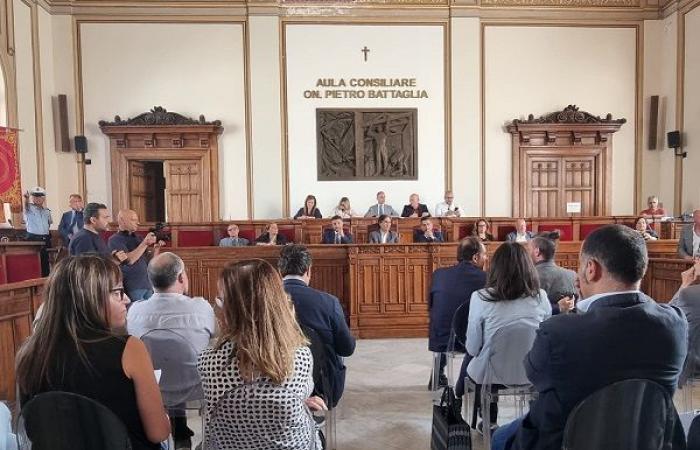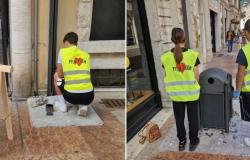Expected open city council meeting entitled: “Bridge over the Strait, prospects and implications for Reggio Calabria and its metropolitan city”, at Palazzo San Giorgio.
In the “Battaglia” room, the civic assembly developed which recorded the reasons for the yes and the no to the work on the Strait. Speakers in order were: Giuseppe Marra of the USB, Vincenzo Musolino of the Pd Villa S. Giovanni club, Francesco Manti for the Csoa “Cartella”, Giovanni Cordova of the Rete No Ponte, Daniele Cartisano, president of the Legambiente Reggio Calabria club, Pino Siclari of the Communist Workers’ Party, Sandro Vitale Ampa on the 25th of April, Giuseppe De Felice, CGIL metropolitan area of Reggio Calabria, Maria Letizia Romeo, legal representative of the People’s University of Peace, Rossella Bulsei spokesperson for the TitengoStretto Committee, Franco Ambrogio, representative of the “Territory and progress” association, Patrizia D’Aguì, legal representative of the civic group “We are Arghillà”, Antonino De Pace, president of the “Cesare Zavattini” cinema club, Monica D’Aguì, legal representative of the “Women in the front row” association, Gerardo Pontecorvo, spokesperson “Green Europe ”, and the lawyer Giuseppe Morabito. The council has accepted the motions of parties, associations and unions, documents which will be recorded in the minutes and will then be published on the online noticeboard of the municipal administration.
The mayor, during his speech, stigmatized the absence of the parties, Lega, Fratelli d’Italia and Forza Italia who chose not to be present in the chamber. In particular, the League which, despite not having councilors in the chamber, instructed the Prime Minister, Enzo Marra, to read a document. «A performance in absentia – the mayor defined it – an unjustified absence of those who for their institutional task must represent the citizens within the highest forum and which instead manifests inconsistency and contradiction».
In relation to the government regulations to be applied in the future, the mayor once again expressed the need to defend the exercise of peacefully expressing one’s dissent even with respect to major works: «Freedom that is being attempted to be compressed with legislative decrees ».
On the topic of the bridge to Falcomatà «The only possible approach is the institutional one which we have pursued from the beginning, up to the last letter cited, not only to ask for the suspension of the terms of the preliminary conference. Institutional approach means moving in synergy on situations that concern the development of the territory and we have done it together, Mayors and Municipalities of Reggio Calabria, Campo Calabro, Villa San Giovanni and Messina. For example, in recent days – he explained – the publication of the agreement for the increase of transport in the Strait area: a single ticket has been achieved, trips have been increased and connections to and from Reggio airport have been improved, to and from the port of Reggio and Villa, thanks to the commitment of Atm and Atam. And it is a sign of how much an institutional synergy can generate positive effects for the territory, even if evidently this is less newsworthy.”
«So we ask that the territories can be protagonists, with an involvement in the dynamics of comparison of the project – continued the mayor – but not out of favor, but because the proposals of the municipalities and municipal administrations following a debate with the territory can sit at a table, which doesn’t exist today, and bring the ideas of the territory. Up to now we have been substantially excluded. Thus the plan of respect and protagonism of the territories which comes before any ideological and technical approach has failed. We cannot suffer what is happening. Furthermore – added the mayor – the resources are not only not there and are insufficient, on the other hand they are taken away from the territories which are therefore not protagonists and lose preparatory resources for development, 2 billion and three hundred million euros of cohesion funds, taken away with a swipe of the towel and without concertation”.
In conclusion for Falcomatà: «As institutions we protect the needs of citizens, we will never say that we are against a public work, but in this case we say “no” with respect to how we got there, with respect to the fragilities, inconsistencies and inconsistencies that they prevent us from any further type of debate.”
During the debate, the interventions of the mayors of the cities affected by the work were recorded. For Campo Calabro, mayor Sandro Repaci: «Everyone faced with such a complex issue has different ways of dealing with the problem – he highlighted – the final decision is up to the municipal councils. You can be for or against, but none of us were consulted. The bridge has been a topic held hostage by political skirmishes for years, at the time of decisions the administrations must express their opinion on the documents that are transmitted”. While not declaring himself for or against the work, Mayor Repaci clarified: «After the in-depth studies of the last few weeks, the procedures put in place demonstrate that the bridge is extremely fragile. In this condition of uncertainty we cannot guarantee the territories.”
For Villa San Giovanni, the mayor Giusy Caminiti explained: «We are the city of the impact of the work and we are aware that unfortunately the 2004 objective law provided for a decision that might not involve the territories, we thought that there could be a decision taken differently. We expected that the politics that had restarted the work would demonstrate that the update of the 2013 project, which was not passed by CIPES, could exceed the requirements of the time, but this is not the case. There are 68 prescriptions from the Scientific Technical Committee, but compared to the many meetings there was much more. We have two preliminary conferences open for environmental, landscape and geomorphological impact. The work done, for which I also thank Falcomatà as metropolitan mayor, allowed us to produce a document with which we asked for the suspension of the MIT investigative conference. It is clear that this is a difficult moment for the city of Villa which imagined different development hypotheses.”
Subsequently, councilor Saverio Pazzano asked for an official commitment for the suspension pending the executive project.
For councilor Giuseppe Marino: «It is paradoxical that in a historical moment in which the right-wing government tries to divide Italy in two, supporting greater territorial autonomy, then with a law decree it tries to impose such a work on two regions impacting and affecting the destiny of future generations. Both the administrations and the mayors were not involved in advance in the discussion and discussion for the creation of a work of this kind. The provision is already unacceptable because it is fundamentally flawed because it lacks the participatory element provided for by the procurement code. A work imposed with a law decree without verifying the urban planning plans, i.e. the landscape regulation instruments of the territories, the plans of Reggio and Messina. It is not my position, but that of the Democratic Party, which expressed itself by sending a document which highlights insurmountable critical issues. A political battle that we will carry on in all necessary venues. Only with high speed could this work have a transport utility, but high speed has disappeared from the plans.”
For councilor Antonino Castorina: «Before thinking about the bridge over the Strait and saying yes or no, there is a need to create a political space in the Strait area to be relaunched as a social space. You can’t synthesize bridge yes and bridge no. I think it is a fair work but important questions must be raised and some reflections must be made: meanwhile there are doubts about resources; then there is the environmental issue, a topic of no small importance which is actually fundamental, if it cannot be built safely it is a problem. The observations of the Ministry of the Environment must be responded to. From my point of view, I will be there whatever is decided, we are certain that we have a serious leader who respects legality like the mayor Giuseppe Falcomatà.”
For councilor Carmelo Versace: «I have expressed myself in a positive manner on all the great works, I do not differ this time. I would have liked to hear the councilors’ ideas on high speed, the surface metro, the connections with Messina. Mayor Caminiti is right to ask the question on its merits: we cannot be faced with an anachronistic project from 10 years ago. We shouldn’t ask ourselves whether or not we are building the bridge but whether or not it is needed for the development of the territory, which if it has to pass through the bridge then I am very much in favor of it. We have to weigh the pros and cons.”
For Giuseppe Giordano: «Today was a demonstration of participatory and extraordinary democracy for those who, with a sense of responsibility, contributed with observations, ideas and fears to bring contributions that this council can only take, weighing the role of an assembly. The point is that we need a follow-up in the Metropolitan Conference. I don’t have a bridge position but I think I’m going into the ethics of responsibility for local administrators. However, it cannot be overlooked that the mayors were right to ask for the suspension of the proceedings and the granting of the simple extension says a lot about the desire to impose the work”.
For councilor Marcantonio Malara: «A story that is more than half a century long and sad, narrated with irregular cadences, as a work leading to development, however, an opportunity was missed for the territories. We arrive at this citizen debate with great critical issues 68 recommendations, 239 additions from the Ministry of the Environment and then there is the denial of discussion with a community on such an impactful work. It is clear that this meeting can only close this meeting by gathering the stimuli and asking the government to stop and give certainties to the territories”.








